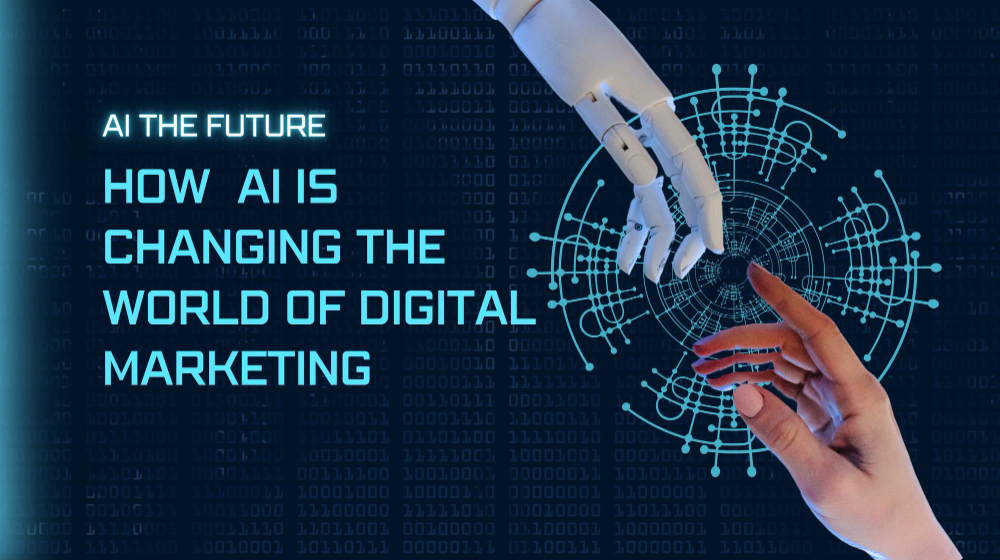
The rapid advancements in artificial intelligence (AI) are reshaping industries across the globe, and digital marketing is no exception. With its ability to analyze vast amounts of data, provide personalized experiences, and automate routine tasks, AI is on the verge of revolutionizing the way marketers approach online campaigns. Here’s a closer look at how AI is set to rule digital marketing in the coming years.
1. Enhanced Customer Personalization
AI is transforming customer interactions by delivering highly personalized experiences. Through AI-powered algorithms, marketers can analyze user behavior, preferences, and purchase patterns. This data allows for hyper-targeted ads, tailored recommendations, and individualized content. Gone are the days of one-size-fits-all marketing strategies. Today, brands can interact with consumers on a personal level, providing them with relevant messages that resonate, driving higher engagement and conversions.
- Personalized content recommendations: AI-driven systems can suggest articles, products, and services that align with user preferences, increasing customer satisfaction.
- Behavior prediction: By analyzing historical data, AI can predict future behaviors, enabling proactive marketing efforts and product suggestions.
- Dynamic content: AI allows marketers to create real-time dynamic ads and website content that change based on user interactions, enhancing user engagement.
2. Data-Driven Decision Making
AI enables marketers to harness the power of big data more effectively. With the ability to process and analyze massive datasets in real-time, AI provides actionable insights that help businesses make informed decisions. From identifying key trends to optimizing marketing strategies, AI ensures that decisions are based on facts and data rather than intuition.
- Improved analytics: AI-powered tools help marketers understand campaign performance and customer sentiment with greater accuracy.
- Predictive analysis: AI can forecast future market trends, helping marketers stay ahead of the competition and adjust their strategies accordingly.
- Performance optimization: AI can continuously analyze marketing campaigns and suggest real-time adjustments for better results, saving time and improving ROI.
3. Automated Customer Engagement
AI is enabling brands to enhance customer engagement through automation. Chatbots and virtual assistants are increasingly being used to provide instant responses to customer inquiries, improving satisfaction and freeing up human resources for more complex tasks. These AI-driven solutions can handle a variety of tasks, from answering questions to guiding customers through their purchase journey.
- Chatbots: AI-powered chatbots can provide 24/7 customer support, respond to inquiries, and even assist with purchases, creating a seamless experience.
- Email marketing automation: AI can automate email campaigns by sending personalized emails at the optimal time, improving open rates and conversions.
- Social media automation: AI-driven tools can schedule posts, engage with followers, and even analyze the best time to post for maximum engagement.
4. Optimized Ad Campaigns
AI is revolutionizing the way digital ads are created, targeted, and optimized. From predictive bidding strategies to real-time ad adjustments, AI-powered platforms ensure that marketing budgets are spent efficiently. By analyzing user behavior and performance data, AI can help marketers fine-tune their campaigns for optimal performance.
- Programmatic advertising: AI automates the buying and selling of ad space, ensuring that ads are shown to the right audience at the right time.
- Audience segmentation: AI can segment audiences more accurately, allowing marketers to deliver highly relevant ads to specific user groups.
- Ad performance analysis: AI tools analyze campaign performance in real-time, providing insights into which ads are resonating with audiences and suggesting areas for improvement.
5. Voice Search and AI Assistants
Voice search and AI-powered virtual assistants like Siri, Alexa, and Google Assistant are becoming increasingly popular, changing how consumers search for information. AI can optimize digital marketing strategies to account for this shift. Marketers need to adapt their SEO strategies to ensure that content is optimized for voice search, as it typically involves longer, more conversational queries.
- Voice search optimization: AI helps marketers understand and implement voice search-friendly content to capture more traffic.
- Conversational marketing: AI-powered chatbots and virtual assistants engage in real-time conversations with customers, building relationships and improving brand loyalty.
6. Content Creation and Curation
AI is making significant strides in content creation and curation. Tools powered by AI can generate high-quality blog posts, social media content, and product descriptions. While human creativity is still essential, AI can handle more routine content tasks, allowing marketers to focus on strategy and innovation.
- AI-generated content: Tools like GPT-4 and others can create well-structured articles, social media posts, and product descriptions, saving time and effort.
- Content curation: AI helps marketers curate the most relevant content for their audience, delivering value and keeping customers engaged.
- SEO optimization: AI tools can analyze keywords and content performance, providing suggestions for improving search engine rankings.
7. Visual and Voice Recognition
AI’s ability to recognize and process images and voice commands is opening up new avenues in digital marketing. Visual search, for example, allows consumers to search for products using images rather than text, while voice recognition is making it easier for users to interact with brands.
- Visual search optimization: Marketers can optimize product images to ensure they appear in visual search results, driving traffic and sales.
- Voice recognition technology: AI can improve customer experience by allowing voice-controlled navigation and product searches on websites and apps.
Conclusion
AI is undoubtedly transforming the digital marketing landscape, making it more data-driven, personalized, and efficient. As AI technologies continue to evolve, their role in digital marketing will only grow stronger. Marketers who embrace AI’s potential will be better equipped to engage their audience, optimize campaigns, and stay ahead in a rapidly changing digital world. The future of digital marketing is AI-driven, and those who don’t adopt it risk falling behind.


